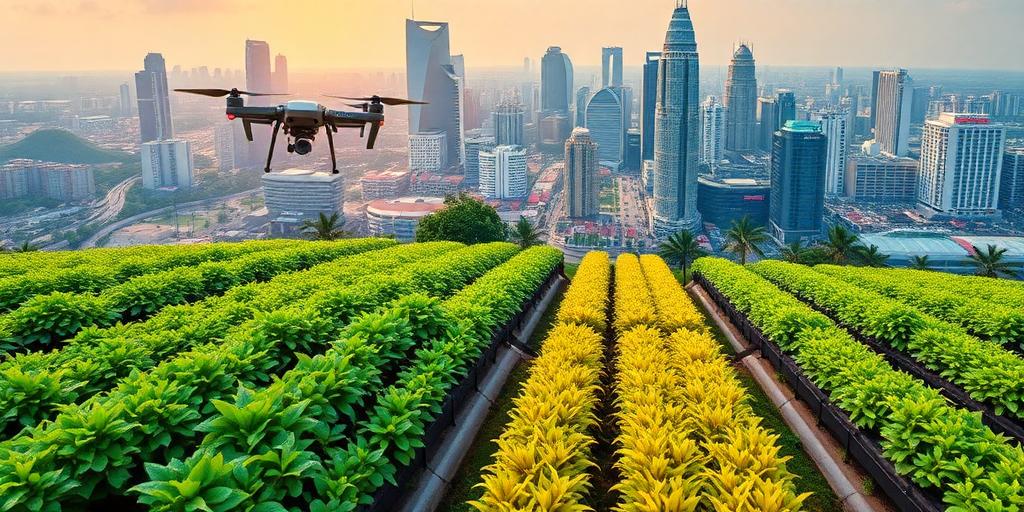The Future of Food Production: Business Innovations (India & World)
The global food system is undergoing a rapid transformation, driven by technological advancements, changing consumer preferences, and the urgent need for sustainable practices. This article explores the innovative business models and technologies that are shaping the future of food production, with a particular focus on developments in India and around the world.
Key Drivers of Change
Several factors are driving the need for innovation in food production:
- Population Growth: The world’s population is projected to reach nearly 10 billion by 2050, increasing the demand for food.
- Climate Change: Extreme weather events, changing rainfall patterns, and rising temperatures are impacting agricultural yields.
- Resource Scarcity: Water scarcity, land degradation, and depletion of natural resources are posing significant challenges.
- Changing Consumer Preferences: Consumers are increasingly demanding healthier, more sustainable, and ethically produced food.
Global Innovations in Food Production
Globally, several innovative approaches are revolutionizing food production:
- Vertical Farming: Companies like AeroFarms and Plenty are using vertical farming techniques to grow crops indoors, using significantly less water and land compared to traditional agriculture. These farms are often located in urban areas, reducing transportation costs and ensuring fresher produce.
- Precision Agriculture: Technologies like GPS, sensors, and drones are enabling farmers to optimize resource use, monitor crop health, and improve yields. Companies like John Deere and Trimble are at the forefront of this revolution.
- Cell-Based Agriculture: Companies such as Memphis Meats and Upside Foods are developing cell-based meat products, which are produced by culturing animal cells in a lab. This technology has the potential to significantly reduce the environmental impact of meat production.
- Alternative Proteins: Beyond Meat and Impossible Foods are creating plant-based meat alternatives that mimic the taste and texture of traditional meat. These products are gaining popularity among consumers looking for more sustainable and ethical food options.
- AI and Big Data: Companies are leveraging AI and big data analytics to optimize supply chains, predict demand, and reduce food waste. For example, startups like Afresh Technologies are helping grocery stores reduce food waste by using AI to predict demand and optimize inventory.
Innovations in India’s Food Sector
India, with its large agricultural sector, is also witnessing significant innovation in food production:
- Micro-irrigation: Companies like Jain Irrigation are promoting micro-irrigation techniques, such as drip irrigation and micro-sprinklers, to improve water use efficiency in agriculture. These technologies are particularly important in water-stressed regions of India.
- Agri-tech Startups: A growing number of agri-tech startups are using technology to address challenges in Indian agriculture. For example, companies like CropIn are providing farmers with data-driven insights to improve crop management, while DeHaat is connecting farmers with buyers and suppliers through an online platform.
- Organic Farming: With increasing consumer awareness of health and environmental issues, organic farming is gaining popularity in India. Farmers are adopting organic practices to reduce their reliance on synthetic fertilizers and pesticides.
- Food Processing: The Indian food processing industry is growing rapidly, with companies investing in new technologies to improve efficiency and reduce post-harvest losses. This includes investments in cold storage facilities, packaging technologies, and processing equipment.
Challenges and Opportunities
While these innovations hold great promise, several challenges need to be addressed:
- Cost: Many of these technologies are expensive, making them inaccessible to smallholder farmers in developing countries.
- Infrastructure: Lack of adequate infrastructure, such as cold storage facilities and transportation networks, can hinder the adoption of new technologies.
- Regulation: Regulatory frameworks need to be updated to keep pace with technological advancements, particularly in areas such as cell-based agriculture.
Despite these challenges, the future of food production is bright. By embracing innovation and investing in sustainable practices, we can ensure a secure and resilient food system for generations to come.
Conclusion
The future of food production hinges on embracing innovative business models and technologies. From vertical farming to precision agriculture, the world is witnessing a transformation in how food is produced, distributed, and consumed. As India and other nations continue to invest in and adopt these advancements, the global food system can become more sustainable, efficient, and resilient, ensuring food security for a growing population.
